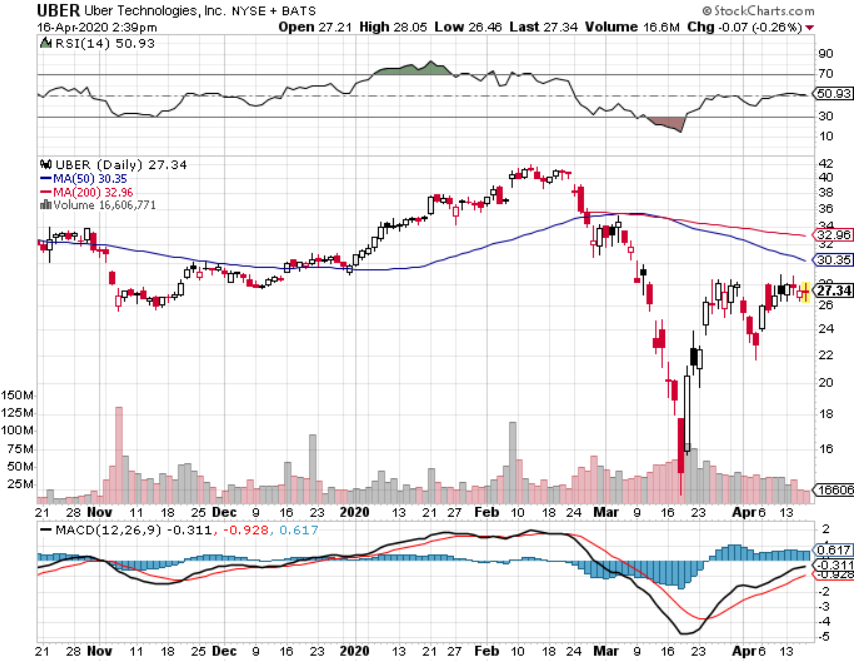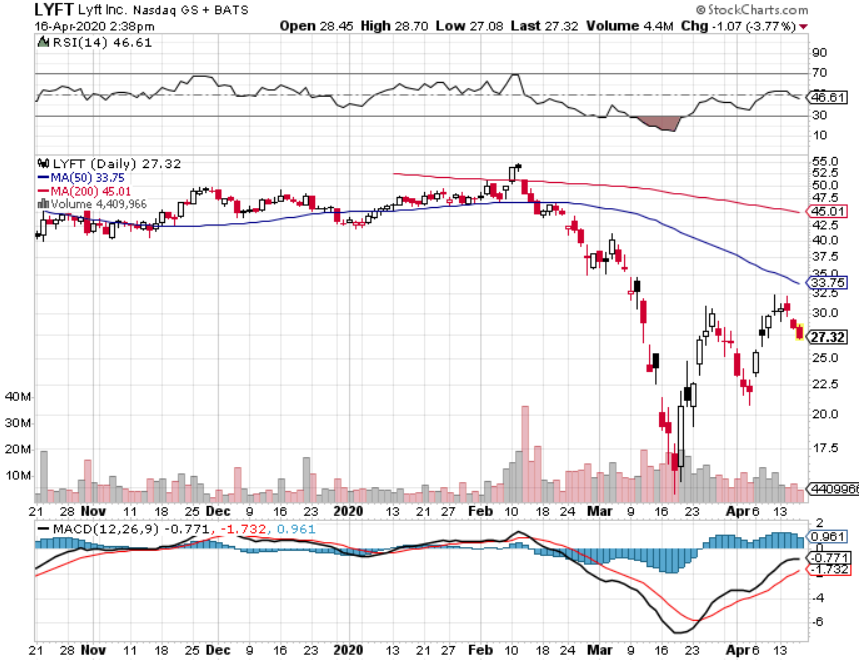Why You Should Sell the Uber Rally
Nimble tech firms like online taxi company Lyft will be penalized in the coronavirus economy as it de-globalizes for a period of time.
If you read the Mad Hedge Technology Letter, you already know that I believe rideshare business models will never become profitable.
Fast forward to today and ask yourself how can these companies make profitability headway when the state mandates shelter in place policies?
The answer is they cannot.
It is not exactly the type of foundational policy that promotes more ride-sharing volume, so bad news for Uber and Lyft.
Uber CEO Dara Khosrowshahi told investors that ride volume has gone down by as much as 60%-70% in ground zero cities like Seattle, and that’s before you consider the pauses in some of its secondary services and the dubious distinction of becoming one of the earliest proof-of-concepts of just how fluid this virus really is.
But Khosrowshahi also told investors that Uber is “well-positioned” to ride the troubles out even in the worst-case scenario of rides down by 80% for the year. And even as ride volume crashes, it is also considering leveraging its network for delivering other things, such as medicine or basic goods.
Basically, Uber specializes in losing money and lots of it.
Then imagine how demoralizing it is for the inferior version of Uber, it’s little brother Lyft.
Lyft has no “other” businesses such as food delivery service Uber Eats, leading me to conclude that this massive retracement in shares must be a bear market rally that will run out of steam.
Finding entry points to short growth stocks is an imprecise endeavor but I do believe that poor revenue reports in the upcoming earnings season is going to cap this bear market rally in Lyft’s shares.
What do we know already?
A global and tech recession will be sharp and it will be worse than the global financial crisis possibly by a factor of 4.
Investors still cannot wrap their head around whether this contagion will spill over into being a depression.
Tech investors will need to respect the “new, new normal” following the pandemic, in which corporates make aggressive cuts to their spending side-- again, bad news for Uber and Lyft.
This type of scenario is especially problematic for Lyft who must spend illogically just to stay in business.
Lyft burned $463.5 million in the third quarter of 2019, which was almost twice the amount that the company lost over the same period of time the previous year.
The fourth quarter net loss includes $246.1 million of stock-based compensation and related payroll tax expenses as well as $86.6 million related to changes to the liabilities for insurance.
That translates into an adjusted net loss of $121.6 million, which is better than the adjusted loss of $245.3 million over the same period last year.
Considering the elevated amount of cash burn to Lyft’s model pre-virus and aware that nobody knows how long the cash burn will accelerate beyond Lyft’s earnings – investors are staring into a black hole of infinite losses moving forward as Lyft’s business model looks worse every day.
I must conclude that the post-coronavirus economy is highly likely to not be kind to marginal companies like Lyft who is a glorified taxi service.
Uber controls about 60% of the ride-sharing market in the US and managed to accomplish this by losing $5.2 billion in the Q2 2019.
Lyft has already slashed its R&D budget by deleting the autonomous vehicle development program.
Yes, the very program that was supposed to be the x-factor in its quest for real profits.
Laughably, Lyft’s executives emphasized that they believed the company will turn a profit in the fourth quarter of 2021, a year earlier than they had previously projected, but that forecasts looks foolish in hindsight.
The one miniscule silver lining for Lyft - fewer discounted rides than it did a year ago.
Lyft is also trying to boost the number of more-profitable rides, which are premium trips such as “airport” or “business” trips.
It’s a shame these premium trips have gone to zero.
The narrative has quickly pivoted to “grow at all costs” to “survive at all costs” and it’s not surprising to see Lyft grossly underperform the Nasdaq index in relative terms and most quality cloud stocks are in the midst of a v-shaped recovery.
Lyft is a sell on a rally type of stock.





